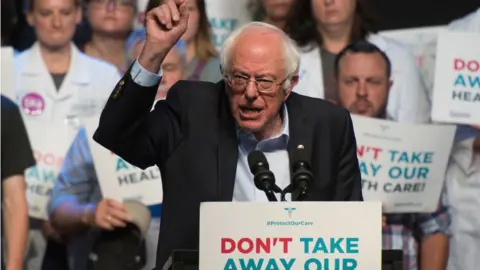Democrats struggle to find a message
 Getty Images
Getty ImagesThe Democratic Congressional Campaign Committee - the group that will help organise what the party hopes will be a successful push to take control of US House of Representatives in mid-term US elections next year - recently tested out some new bumper-sticker slogans.
It did not go well.
There were several variations on the resist/persist theme and one that promised to "Make Congress blue again", referencing the colour associated with the Democratic Party on electoral maps.
Drawing the most attention - and scorn - however was: "Democrats 2018: I mean, have you seen the other guys?"
Opposition to President Trump and Republicans has been a uniting and motivating factor for Democrats since last November. It has led to massive protests in cities across the US and a fundraising windfall for many politicians and activist groups. At this point, however, some on the left are hoping for a message that's a bit more affirmative; that offers something to vote for, not against.
For them, the bumper sticker was a reminder that the Democratic Party doesn't have a cohesive pitch to voters.
 DCCC.org
DCCC.org"Democrats are faced with a dilemma heading into 2018: Are they willing to stand up for the idea of universal healthcare, or do they really think they can win with 'have you seen the other guys?'" writes Charlie May on the liberal website Salon.
Drew Magary of GQ was even more blunt.
"The political hopes of a majority of Americans currently reside in the hands of a party that has all the strategic acumen of Elmer Fudd and, even worse, still doesn't realise its shortcomings," he writes.
In search of a champion
If the Democrats lack a clear vision, if their message to America seems to some like it's been crafted by a committee, part of the reason can be simply explained. A vision demands a visionary; a message requires a messenger.
The party's rank and file are in search of a champion, and a rotating cast of Democratic politicians have taken the spotlight in the past few months, only to cede it to the next contestant.
Massachusetts Senator Elizabeth Warren gave a Senate floor speech that drew the ire of Republican leader Mitch McConnell, launching a thousand "but she persisted" gifs. Freshman California Senator Kamala Harris had her star turn, sparring with Attorney General Jeff Sessions during his recent committee testimony on Russian election hacking.
Even Hillary Clinton, who still generates mixed feelings from some Democrats after her electoral defeat, edged in on the action last week, thanks to a snide Republican National Committee tweet accusing Democrats opposed to Mr Trump's healthcare reform of not offering their own solutions.
 Hillary Clinton
Hillary Clinton"Where's your plan?" the Republicans asked of the former secretary of state.
"Right here, includes radical provisions like how not to kick 23 million people off their coverage," she wrote back, linking to a policy paper on her campaign website. "Feel free to run w/it."
Then there's Bernie Sanders, who rode a grass-roots tsunami in the Democratic presidential primaries last year to record levels of fundraising, massive crowds and more than 13 million votes.
He's still around, he's still raising money, and he's still speaking to huge audiences. Even though Mr Sanders will be 78 in 2020, Vox's Matthew Yglesias says he should be considered the party's presidential front-runner.
"He's doing exactly what a candidate who fell short needs to do to run a second time," he writes. "He's established a national political organisation, he's improved his ties with colleagues on Capitol Hill, he's maintained a heavy presence in national media, and he's travelling the country talking about issues."
Of course, if Mr Sanders becomes the face of the Democratic Party, he will take political fire the likes of which he has not yet seen.
 Getty Images
Getty ImagesRepublicans have generally held their tongues, but the Vermont senator could feature prominently alongside House Minority Leader Nancy Pelosi in mid-term election adverts.
Democrats vying for the spotlight will be less reluctant than Mrs Clinton was in 2016 to engage the self-processed democratic socialist. With front-runner status comes a very large target painted on one's back. Just ask Jeb Bush.
The battle to come
Mr Sanders' political perseverance is also a reminder that the divide within the Democratic Party that was exposed in the Sanders-Clinton primary fight still exists, even if it's been subsumed, somewhat, by anti-Trump fervour.
In a New York Times opinion piece, former 2008 Hillary Clinton campaign strategist Mark Penn and New York City Democratic politician Andrew Stein recommended their party head "back to the centre", saying that "the siren calls of the left" have weakened the party.
The piece prompted howls of outrage from progressives everywhere.
"The whole op-ed is really just an endorsement of centrist white nationalism filled with catastrophically asinine proposals that, if adopted, would enrage most Democratic voters," Mark Joseph Stern writes in Slate.
That could be just a taste of the internecine warfare to come.
Nowhere to go but up
The Democrats hit bottom last November, with Donald Trump's elevation to the presidency, continued Republican control of Congress and decimation at the state legislative level, and they've been scraping along the bedrock ever since.
While they've over-performed in several special elections in traditionally conservative congressional districts, "better than expected" results won't stop Republicans in 2018 or Mr Trump in 2020.
Then again, the Republican situation seemed equally hopeless after Barack Obama's big wins in 2008 and 2012.
The political wind almost certainly will be at Democrats' backs in the mid-term elections next year, even if there is no clear-cut leader giving voice to their cause. And heavily contested presidential primaries - as 2020 will almost certainly be for Democrats - are an excellent way of discerning who has the most potent political message for a party. Mr Trump himself was evidence of that last year.
It's still very early in the game. That's both the good news for Democrats and - when each week in the Trump presidency seems like a lifetime - the bad news.
